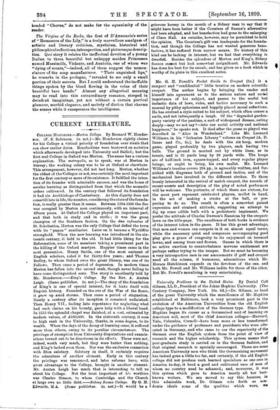Mr. G. H. Powell's Pocket Guide to Croquet (1s.) is
a compact and " confidential " little treatise on modern scientific croquet. The author begins by bringing the reader and himself into agreement as to the serious nature and social importance of his subject, and passes to the useful but inelastic data of laws, rules, and tactics necessary to such a manual by pithy aphorisms and happily placed moral reflections. He has evolved a style suited to his subject, which often causes a smile, and not infrequently a laugh. Of the " degraded garden- party variety of the pastime, a sort of widespread disease, eating deeply—may we not say ?—into our social activity and national happiness," he speaks not. It died after the game so played was described in " Alice in Wonderland." Like Mr. Leonard Williams. in his "Isthmian Library" volume on Croquet (A. D. Innes and Co., 5s.), he deals with the six hoop, modern game, played preferably by two players, each having two balls. The ground is marked out by white lines, as in tennis, and is 35 yards long by 28 yards wide. The hoops are of half-inch iron, square-topped, and every regular player brings, or ought to bring, his own mallet. Mr. Leonard -Williams's treatise covers 294 pp., is agreeably written, and fur- nished with diagrams both of ground and tactics, and of the mechanical laws involved in the different strokes. To those keenly interested in the revival of match croquet, the records of recent events and description of the play of noted performers will be welcome. The portraits, of which there are sixteen, for the most part represent celebrated players, mallet in hand, in the act of making a stroke at the ball, or pre- paring to do so. The result is often a somewhat pained expression and strained attitude, suggesting an attempt to dig up some edible bulb with a prehistoric implement. We prefer the attitude of Charles Dawson's Nansicaa by the croquet- lawn on the title-page. The excellence of both books is evidence of the interest taken in the game. It has this great advantage, that men and women can compete in it on almost equal terms, while the necessary quiet and composure accompanying good play give a grace of congruity to its enjoyment on terraced lawns, and among trees and flowers. Games in which there is no active exertion to counterbalance nervous excitement are perhaps rather trying to the temper. But we must be becoming a very introspective race in our amusements if golf and croquet need all the solemn, if humorous, admonitions which Mr. Horace Hutchinson expends on the devotees of the one, and both Mr. Powell and Mr. Williams indite for those of the other. But Mr. Powell's moralising is very entertaining.


































 Previous page
Previous page